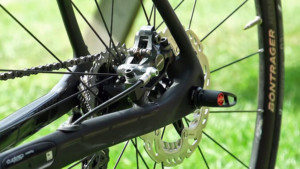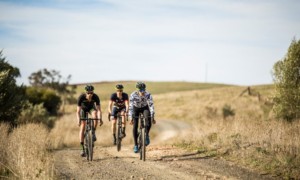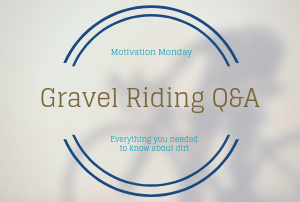It's been said that there's no such thing as a stupid question. And whoever said that is right. Chances are if you have a question about something, someone else is wondering the same thing.
Gravel questions are one of the most common questions I get these days. So since a lot of you probably have similar questions, it's time to answer some of them and spark your stoke for slaying some groad.
It's time for the Guru of Gravel to answer your questions!
It's no secret that gravel riding and gravel events have become one of the hottest and fastest growing segments of the cycling world. Gravel bikes are everywhere and new events are popping up all the time. But with all the new tech and new events out there, how do you know what bike or event is right for you?
Most of my listeners know that I've been riding dirt and gravel for years. Hell, it wasn't even a THING when I was riding it and writing about it. But here we are, and getting dirty is the popular choice for a lot of riders.
That being said, I've got a bunch of questions that my listeners and readers have asked me. And because I'm sure a lot of you have similar questions, I'm going to answer some of them in today's episode of the Tailwind Coaching Podcast.
Podcast: Play in new window | Download (Duration: 40:25 — 28.7MB)
Subscribe: RSS
Tanya wants to know about gravel bikes and what kind of bike you should ride for an event?
The answer to that question really depends on a couple of factors. You'll need to ask yourself how tough, how long, how much gravel overall is involved in the event. The more “off road” you get, the closer to a mountain bike you should be on. The more road oriented, the closer to a road bike you should be using.
For example, a gravel loop like this recent GCN ride has a fair amount of asphalt on it. Sure, you're going to find some gritty and gnarly dirt roads, but you're more than likely going to want something that rides more like a road bike.
Contrast that to some events that love to throw singletrack into the mix, and you might want to look at a hardtail XC mountain bike. If you're spending most of the day off-road, you'll probably want something that will be a little more forgiving.
Don't forget that the type of event you're riding will dictate your choice of tires as well. The more gnarly the dirt, the bigger the rubber should get.
 Adam asks if disc brakes are required for gravel bikes?
Adam asks if disc brakes are required for gravel bikes?
This is an easy one, and it comes from the mountain bike world. Mountain bikes have been on disc brakes for years, and gravel bikes are going that way too. Disc brakes aren't required for a good gravel bike experience, but they sure do make life a lot easier.
If you're looking to start gravel riding but you're not in the market for a disc brake bike, you can always consider using some really solid brake calipers. [easyazon_link identifier=”B01M12V4B8″ locale=”US” tag=”taicoaandthed-20″]Dura Ace calipers[/easyazon_link] are one of the best on the market for that.
Otherwise, hydro discs are definitely the way to go for modulation and pure power.
Sean is asking whether he should go with electronic shifting or mechanical shifting for his gravel bike
There are plenty of arguments on both sides of this coin, and the short answer is: it depends.
Mechanical gears are the de-facto standard for gears. They're easily repairable on a trip: almost any bike shop will have the parts to repair or replace a damaged derailleur or shifter. Cables are also far more plentiful than DI2 wires or eTap batteries out in the boondocks. Mechanical can be more finicky with adjusting and being knocked out of adjustment, is more susceptible to dirt and contamination. And of course, a broken cable can leave you in a basically unusable gear.
Electronic has a significantly increased level of complexity in terms of components, but current electronic systems are pretty foolproof. They are beautifully precise and consistent, rarely succumbing to fouling or dirt. Parts can be tougher to find, especially out in the middle of nowhere when on a multi-day adventure. And you always have to worry about running out of juice on a ride. The nice thing about a battery dying on a ride, however, is the ability to leave the derailleur in a place you want it and just pedaling off into the sunset.
Sarah wants to know what specific fitness you need for gravel events
Here's the thing: You don't need specific fitness to ride a gravel event, you just need to focus on a few things a little more. It's not the same as track racing or cyclocross, for example. You really can get by on any kind of endurance-based fitness. But if you want to be competitive, I recommend a couple of different kinds of intervals to get you as competitive as possible.
To get the most out of your gravel grinder experience, you'll want to focus on force production, muscular endurance, cadence range and, of course, endurance capacity. VO2 capacity and repeatability are also critically important for getting through gravel climbs, and for doing it over and over again.
As a side note, you'll need bike handling skills too: upper body strength, the ability to move the bike around underneath you and hold a steady line will be a huge benefit to getting you to the finish line successfully. And if you want my opinion on how to do that: ride your mountain bike.
 Richard wants to know what makes a good gravel event?
Richard wants to know what makes a good gravel event?
If you want to find a good gravel event, you should consider my big 4:
Organization – You want an event that is well organized with lots of communication, good quality sponsors, beer, food, etc. Don't let a ride become a “bring your own dinner” kind of situation. If it's not well organized, it's probably not too good.
Comraderie – This means not fighting for position in a peloton, just encouragement and fun from others, guys riding all kinds of bikes in all kinds of gear. From team kits to flannel shirts, you want to see a diverse group of fun people just having a good time.
Varied terrain and seeing something you've never done before – This is THE purpose of gravel: exploring. Any event that doesn't have you exploring means nothing special, and that's not a good event in my book.
Unique character – gravel is like the spring classics: races that have very special kinds of draw for each event. Each event should have something special, almost a “gimmick” if you will.
Tony wants to know why go gravel?
Why should I start riding gravel? Well, here's a couple of things to help convince you:
There are the training benefits, first of all. A tougher surface with more resistance will make it much more of a challenge in terms of intensity and endurance. Additionally, the terrain is typically tougher on most gravel events. Most gravel roads are built straight up the side of a mountain, not graded down like your typical asphalt roads are.
All that loose terrain also increases your bike handling skills significantly. When you have no other choice but to stay upright when the dusty ground is trying to throw you around, you suddenly get good at handling the worst the world can throw at you.
Add to that the awesome routes and adventuring options, the lack of cars, the beautiful vistas, the quiet back roads and the bucolic scenery, and you'd be silly NOT to go ride a bunch of gravel.
Katie wants to know of some good gravel events:
Check out these gravel events:
Unpaved PA: This is a really well designed, really killer event. It's a toughie too. Buy venlafaxine xr 150mg , go to our pharmacy! I've had to pull some of the workouts from my battenkill/gravel training plan, which helped me handle the high resistance dirt roads and the long climbs.
This one is a great event with some nice varied terrain and a lot of beautiful scenery in New Jersey of all places. It's challenging, but not nearly as difficult as some events are.
You can check out my recap of MKF from last year. I'll just say this: it was a great experience with terrain I've never seen and ridden, full of great camaraderie and fun.
This one is hellish. I've not done it, but there's plenty written about it. Be prepared for hell.
It's the hot number right now, and it's one of the hardest. That's enough said about it.
D2R2:
This guy was one of the original gravel grinders. Murderous climbs and high distances make it a true stretch goal.
So there you have it folks. Plenty of gravel answers for your gravel questions. If you have questions you want to have answered on a future episode of the Tailwind Coaching Podcast, feel free to send them off to me. Chances are if you have that question, someone else does too.
